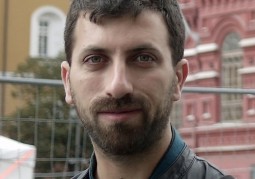Tuesday through Sunday from 12:00 until 21:00
Closed Monday
Admission is Free


The Future Generation Art Prize 2012 Special Prize Winner
Ahmet Öğüt was born in 1981 in Diyarbakır, Turkey. He lives and works in Amsterdam and Istanbul. Öğüt graduated from the Painting Department of the Faculty of Fine Arts at Hacettepe University, Ankara, in 2003 and completed his MA at the Faculty of Art and Design at Yıldız Technical University in 2006. In 2010 Öğüt received the Kunstpreis Europas Zukunft from the Galerie für Zeitgenössische Kunst in Leipzig. His work has been shown at the 5th Berlin Biennial for Contemporary Art (2008), the 53rd Venice Biennial (2009), the 12th Istanbul Biennial and 4th Moscow Biennial (2011).
With his drawings, installations, performances and films Ahmet Öğüt reflects on movements, conflicts and innovations in the global economic and geo-political space. Öğüt always starts from or refers to his own well-defined context as a Turkish-Kurdish artist. He explores basic principles of time, distance and speed and uses humour and irony as an essential artistic strategy in his politico-cultural critical discourse.
Watch the works and the video profile of the artist
For the PinchukArtCentre Öğüt has created a new work that reflects on and participates in the idea of “open source”. This principle means that all research and innovation are public and can be used by everybody, a strategy opposed to personal copyright and patents. Öğüt explores how such a network could exist beyond the digital realm.
“The jury awards Ahmet Ogüt a special prize for his extraordinary ability to escape the limits of the art institution and the notion of the art award through the distribution f money, and the parallel distribution and sharing of knowledge that lies at the core of eyewriter/DIY/Arbakir. Focusing his energy and time on writing the web address of a project based on empowering the disabled, onto one dollar bills, and subsequently dedicating his time to the joyful participation in 5 weddings in a small town in Turkey, he acknowledges that artistic practice can be redirected towards the production of emancipation.”